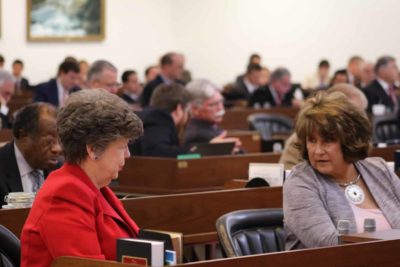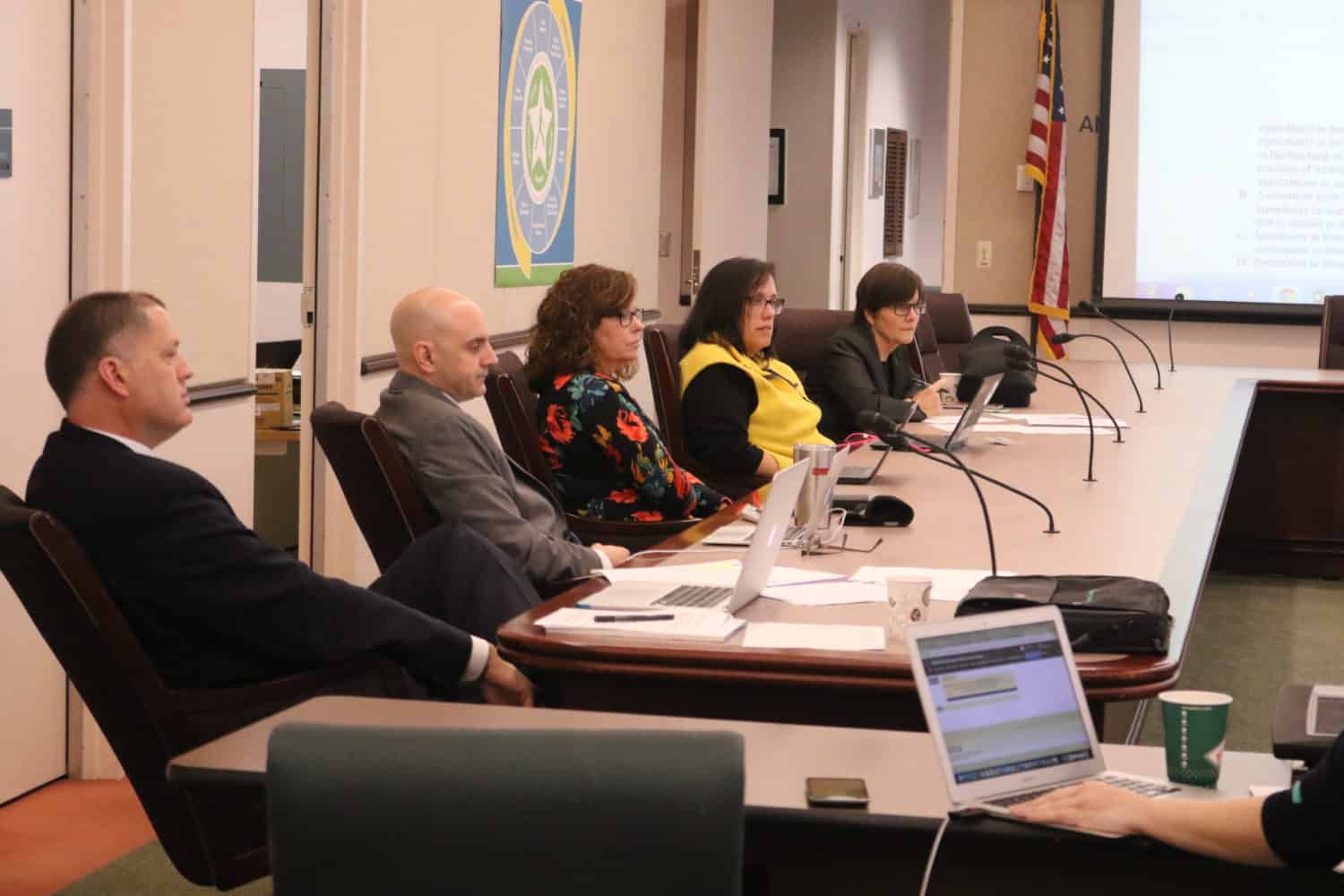The preparation system for the state’s teachers is changing under legislation passed last session through the work of the NC Professional Educator Preparation and Standards Commission.
The commission overseeing educator preparation programs and teacher licensure met for the second time Thursday to agree on some guidelines for its work. Senate Bill 599 consolidated previous laws, welcomed educator preparation programs outside of institutions of higher education for the first time, and called for the commission that reports to the State Board of Education to set standards for programs.
As with school districts across the state, holding preparation programs accountable is complicated. Commission members — including eight appointees from each the House and the Senate as well as Superintendent Mark Johnson and Teacher of the Year Lisa Godwin — circled around how much test scores matter, how much flexibility should be given to individual programs, and how to fill holes in teacher and administrator pipelines.
The commission passed its bylaws and recommendations to the board on content and pedagogy, teacher assistants and internships, accountability requirements, school administrator preparation programs, and a complaint process. Drafts of those policies, some of which were amended before approved, may be found here. Some of the commission’s functions and rules are written in law, which the commission can not amend but can add to.
Commission members include:
- Ann Bullock – dean of the School of Education at Elon University
- Joseph Childers – principal of Simon G. Atkins Academic and Technology High School in Winston-Salem
- Van Dempsey – dean of the Watson College of Education at UNC-Wilmington
- Aaron Fleming – superintendent of Harnett County Schools
- Lauren Genesky – Teacher at Millbrook High School in Raleigh
- Lisa Godwin – NC Teacher of the Year from Onslow County
- Anthony Graham – dean of the College of Education at North Carolina A&T State University
- Robin Hiatt – teaching and learning coach with Johnston County Schools
- Samuel Houston Jr. – president and CEO of the North Carolina Science, Mathematics, and Technology Education Center
- Mark Johnson – superintendent of Public Instruction
- Glenda Jones – assistant superintendent of Cabarrus County Schools
- Connie Locklear – director of the Indian Education Resource Center in the Public Schools of Robeson County
- Meaghan Loftus – principal of Ashley Park PreK-8 School in Charlotte
- Michael Maher – assistant dean for Professional Education and Accreditation at N.C. State University College of Education
- Ellen McIntyre – dean of the Cato College of Education at UNC-Charlotte
- Patrick Miller – superintendent of Greene County Schools
- Hank Weddington – dean of the College of Education and Human Services at Lenoir-Rhyne University
- Westley Wood – executive director of Personnel and Human Resources for Wilkes County Schools
Committees within the commission were given sections of policy to review or to create.
“Adequate” definition
A part of the law passed for the commission’s preparation program standards reads: “EPPs providing training for elementary education teachers shall include: A) Adequate coursework in the teaching of reading, writing, and mathematics.”
The committee reviewing this section, led by Ellen McIntyre, suggested requirements for how much coursework education students take in a program in each subject: six credit hours in math content, six in the teaching of math, six in the teaching of reading, and three in the teaching of writing. By the end of the discussion, the commission took out the requirements.
McIntyre voted against that motion.
“We’re going down the wrong path by just having it as generic as we have it in the law right now,” she said. McIntyre said the requirements hold students up to necessary standards and help them meet the required tests.
Michael Maher said test scores for elementary education students have been low in recent years. His N.C. State University program requires even more math credits than were proposed in order to raise those scores. He said elementary education students have to take Calculus. Designing new courses for students takes time and energy but is worth it, he said.
“Yes, candidates are going to have to do some work to comply with some of these but if we’re serious about passing these exams, if we’re serious about improving both literacy and numeracy in K-12 schools, then we’ve got to set some standard,” Maher said.
But others were hesitant to put specific time requirements on students’ learning.
“If the goal is to go competency-based, why do we continue to say we’re going to treat everybody the same and give them standardized tests?” said Glenda Jones.
Jones, who works at the district level, said high test scores have not always correlated with more effective teachers.
“We’re moving more toward (competency-based assessment) even in the public school sector with our students,” she said. “I go back to, if you can eliminate a test and put more in the classroom or in the program with the students so that they can make application to something that they can transfer into the classroom, that tells me more than the test score. I’m looking at that test score for one thing: to get you a license. That’s it. That doesn’t determine a great teacher.”
Commission chair Patrick Miller suggested they leave out specifics for now and revisit the discussion at a later point.
“Let’s strike the credit hour piece out, make the EPPs accountable for what they’re saying needs to be taught … and go on,” Miller said. “If we still have heartburn about this in the spring, we can talk about it again, but I think that if we get this policy out and recommended to the State Board as a starting point, then we’re at a good place and we can continue down the road. But just because we’re not prescribing a number of courses or number of credit hours, we’re not saying the EPPs are not responsible for the content that’s listed.”
Low-performing preparation programs
Just as there are low-performing schools, there will be low-performing educator preparation programs. The Department of Public Instruction will issue multiple documents annually for each program to assess its quality: an annual performance report, a report card, and a risk assessment.
There are three steps in identifying low-performance and holding programs accountable: an issued warning, probation, and revocation. Under the policy recommendation, a warning will be issued if the program does not meet performance standards for a year, if any two demographic groups do not meet performance for a year, if any one demographic group does not meet performance for two years, or if the board decides the program has violated rules that warrant a warning.
The probation status will be given if the program’s students do not meet performance standards for two consecutive years, if any three demographic groups do not meet performance standards, if any one demographic group does not meet performance standards for three years, if the board deems the status necessary for a violation of rules, or if the Council for the Accreditation of Educator Preparation (CAEP) gives the program one or more stipulations.
Stipulations from CAEP, Maher said, are serious concerns that could result in the loss of accreditation.
“We felt it was important that, should a campus receive a stipulation, there has to be an outcome at the state level — that you shouldn’t be able to receive a stipulation and be fully accredited or fully approved within our system, if that makes sense,” Maher said.
A revocation would come if the program was on probation for three consecutive years or, if after one year on probation, the board finds revocation necessary. Instead of revocation, the board can also provide a monitor or other assistance to programs, require the program to hire an outside entity for services, or manage its enrollment.
Ann Bullock said she worries a few students could pull down the performance results of an entire program when there are not large numbers of students in different demographic groups.
“So if I’m a small program, and I have one Asian male who continues to not be successful in some way, there’s not a minimum in here?” Bullock said. “… There a couple people that get sanctioned related to licensure tests this summer that it was one student that had taken the test eight times and it dropped their average.”
Innovative/experimental programs
Under recommended policy, there is an exception in the application process that gives more flexibility to certain preparation programs with how they are set up, run, and monitored. The alternative programs are established by a school system, community college, or college/university and are not held to the same standards as other educator preparation programs.
McIntyre said she was concerned there would be a boom in preparation programs getting around rules through the part of the policy. But these alternative programs are costly, said Andrew Sioberg, service support coordinator for DPI’s IHE Program Approval Directory. Sioberg said there are less than five of these cases in the state right now.
Maher, who set up a program through this exception this year, said most local school districts do not have the financial resources or human capital to take advantage of the exception. He suggested only North Carolina public schools and institutes of higher education should be able to use this exception.
“As it sits right now, anybody can come in and do that, and what I’m saying is I want to shut this path to North Carolina LEAs, community colleges, and IHEs. And if an LEA says, ‘Well, we’re gonna do it, but we’re gonna … take a provider from outside of North Carolina,’ but the LEA is the one who’s really got the skin in the game.”
The policy has been in place since 2007, but Maher said he is concerned out-of-state institutions will be drawn to the loophole.
“I’m just concerned that now that … we’ve really gotten serious, I think, about sanctions, accountability, that there could be other entities who’ve been thinking about coming to the state, and now see a way to bypass what we’ve put in place for ourselves by exploiting this.”
Editor’s Note: Sam Houston is on EducationNC’s Board of Directors.
Recommended reading




